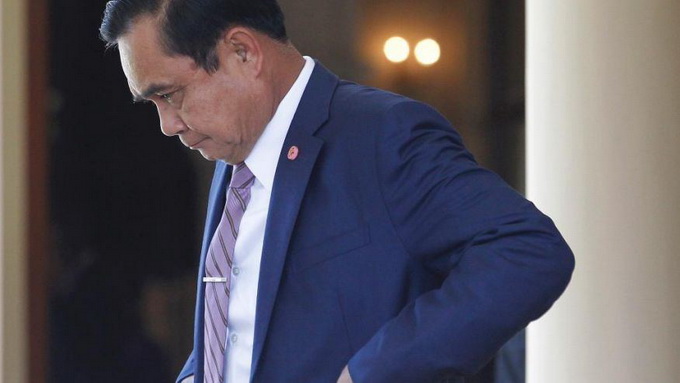Thailand’s New Law Could Be Worse Than Martial Law
The new law appears to be even more draconian, according to critics of the regime.

Thailand’s Prime Minister Prayuth Chan-ocha, center, leaves a meeting at Government House in Bangkok, Thailand, Thursday, April 2, 2015. Thailand’s junta lifted martial law, which was imposed in the run-up to their May 22, 2014, coup — but then quickly replaced it with another set of draconian laws innocuously called “Article 44.” But make no mistake — 10 months after staging the coup, a military junta is still ruling Thailand, essentially with absolute power. (AP Photo/Sakchai Lalit) (The Associated Press)
The decision of the Thailand government to lift martial law on April 1 has failed to appease critics after General Prayuth Chan-ocha signed a new law that imposed harsher security measures across the country.
Martial law was declared on May 20, 2014 to restore order in the nation’s capital, which was besieged at the time by street clashes between pro-government and opposition forces. Two days later, a coup was launched by Prayuth, who established a government called the National Council of Peace and Order. The NCPO drafted an interim Constitution that was used to appoint government bodies including the legislature. Prayuth’s appointees subsequently named him as the country’s prime minister. But despite the existence of civilian agencies, martial law was retained.
The government was probably hoping to deflect international criticism when it revoked martial law this week. Yet it is hoping to restore confidence by replacing martial law with Order Number 3/2558 (3/2015), which invoked article 44 of the interim constitution to justify the enactment of extraordinary security-related measures. For some critics, the new order is akin to the draconian provisions of Thailand’s 1959 charter, which gave the military leader vast powers to persecute and prosecute the opposition.
The new order provides the appointment of “peace and order maintenance officers” from the ranks of the military who are given broad powers to defend the security of the state. These army personnel can search homes, summon and arrest troublemakers, confiscate property, and detain suspected individuals in special premises for up to seven days even without judicial authority.
Article 5 of the order could further undermine free speech in the country. The provision reads: “Peacekeeping Officers are empowered to issue orders prohibiting the propagation of any item of news or the sale or distribution of any book or publication or material likely to cause public alarm or which contains false information likely to cause public misunderstanding to the detriment of national security or public order.” (Unofficial translation by iLaw, the Freedom of Expression Documentation Center)
Thailand media groups described the article as a “greater threat to press freedom and freedom of expression than the lifted Martial Law.”
“Civilians are also at risk, as people who communicates and discusses topics through online social media that contain information viewed by the authorities as threat to national security, cause of public alarm, spreading of false information or public misunderstanding will be punished on the same condition,” the media groups warned in a joint statement signed by the Thai Journalists Association, National Press Council of Thailand, Thai Broadcasting Journalists Association, and News Broadcasting Council of Thailand.
They urged the NCPO to clarify the intent of the article and provide a more specific definition of “national security threat” and “dissemination of false information.”
Freedom of assembly is still curtailed, as stated in article 12 of the order which bans “political gatherings of five or more persons.” Referring to this provision, the Southeast Asian Press Alliance asked: “If the aim of the order is to lift martial law, why are such activities still banned and what are the criteria for giving permissions to such gatherings?”
Meanwhile, the Thai Lawyers for Human Rights reminded the public that the order didn’t remove martial law in the southern border provinces of Pattani, Yala, Narathiwat, and the four districts in Songkhla. A Muslim separatist movement is currently active in the southern region.
Anusorn Iamsa-ard, spokesperson for the former ruling Pheu Thai Party, likened the lifting of martial law and the enactment of the new order as “running away from a tiger into a crocodile.” Sathit Pitutecha, deputy chairman of the Democrat Party, warned NCPO that the order “will destroy the confidence of both domestic and foreign communities, especially the international communities, who will only see Thailand as more of a dictatorship.”
Even the National Human Rights Commission, which rarely criticizes the NCPO, issued a statement about the detrimental impact of the measure. “The PM has to be cautious about falling into the trap of having so much authority, which could lead to criticism later on. During a time that the country is trying to promote national reform and solve inequality issues, I doubt that it’s suitable to use Article 44 or martial law,” said NHRC Commissioner Niran Pitakwatchara.
Instead of assuring the international community about its commitment to democratic transition, Thailand further damaged its reputation by choosing to affirm its restrictive policies.
“Normally I would warmly welcome the lifting of martial law, but I am alarmed at the decision to replace martial law with something even more draconian, which bestows unlimited powers on the current Prime Minister without any judicial oversight at all,” said UN High Commissioner for Human Rights Zeid Ra’ad Al Hussein.
[H/T The Diplomat Magazine]
For bizarre stuff and news oddities check out the link: